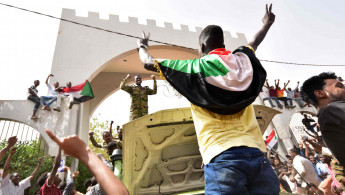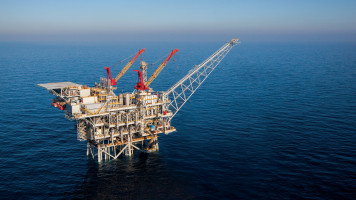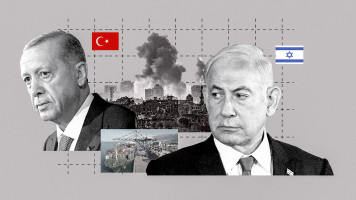'A portal into tomorrow's Sudan': Inside the sit-in that brought down Sudan's dictator Bashir
Sudan witnessed what seemed to be a dramatic conclusion to three painful decades of its history early on Thursday morning.
Following months of widespread, popular protests against the rule of former president Omar al-Bashir – which on Saturday ballooned into a mass sit-in attended by millions, according to eyewitnesses – a dream became reality. Bashir stepped down, news reports said, ending his tenure as Sudan's longest-serving president just two months shy of 30 years in power.
Joyous celebrations erupted across the country and among the Sudanese diaspora as protesters waited for hours with baited breath for an announcement by the military, the country's historic power broker which had already displaced four rulers over the past five decades.
But when former vice president and defence minister Awad Ibn Auf, dressed in military fatigues, declared himself Sudan's new president in a televised address, protesters felt their revolution had been usurped.
Ibn Auf, a regime mainstay and right-hand man to the deposed Bashir, also announced a three-month state of emergency, a two-year transition period during which Sudan would be governed by a military-led transitional council and a nightly curfew.
"We don't want another Sisi in Sudan," Maaz Hmeda, an unemployed graduate, told The New Arab just hours after Ibn Auf's announcement.
Protesters' chants at the sit-in, by then habitual, changed almost immediately.
"We won't stop until Ibn Auf falls," they cried. "It [the regime] fell once, and it will fall again."
Over four months of protests, millions of Sudanese have made their aims clear.
There is a reason why Sudan's protesters have taken up the slogan coined in Tunisia eight years ago: "The people want the fall of the regime!"
Their most-used slogan, "just fall", they say, has never referred to Bashir alone.
"To me the regime has not fallen yet," Samahir Omerelfaroug, a 24-year-old medical student, said.
"From the beginning, the peaceful uprising wasn't against Bashir only, but it was against the whole corrupted system."
While the military has taken the credit for toppling and arresting Bashir, it is clear that the monumental sit-in in the capital Khartoum and protests against the country will continue. In fact, although many Sudanese believed only the military had the power to remove Bashir from power, his overthrow had been prompted by the massive turnout outside their own headquarters.
 |
We don't want another Sisi in Sudan |  |
The fateful day of 6 April
The march towards the Army General Command had been planned to coincide with the 34th anniversary of Sudan's 6 April Revolution, when mass protests prompted the military to topple President Gaafar Nimeiri in a bloodless coup.
Like most of the other protests since mid-December, the demonstration had been called for my the Sudanese Professionals Association (SPA), an umbrella group which has become the leading voice of anti-Bashir protesters.
"I knew there would be a lot of protesters because we have been preparing for this day for two weeks," explained Nadia, a 22-year-old architect. "There were even people from outside Khartoum who participated in the protest… it was so beautiful and breathtaking."
!['Millions' of Sudanese protesters began gathering outside the Army General Command in Khartoum on Saturday [Anadolu] 'Millions' of Sudanese protesters began gathering outside the Army General Command in Khartoum on Saturday [Anadolu]](https://www.newarab.com/sites/default/files/styles/medium_16_9/public/media/images/390ACF4E-D707-4104-B37B-8988C1977B05.jpg?h=a7a90beb&itok=D8sMqNQ6) |
| 'Millions' of Sudanese protesters began gathering outside the Army General Command in Khartoum on Saturday [Anadolu] |
Protesters had gathered at three meeting points across the city, from which they would march to the military headquarters.
At 2:30 in the afternoon on that "fateful day", Waleed and his friend were among those gathered next to the Afra Mall.
|
|
Walking along the Airport Road, they encountered "huge crowds" of people - and the security forces.
When the security forces fired tear gas into the crowds, Waleed and his friend escaped to another neighbourhood to seek shelter in a residential complex.
It wasn't until 7:40 in the evening when the two friends were able to reach the military headquarters, due to the heavy presence of the National Intelligence and Security Services (NISS), who he says were arbitrarily arrested anyone on the streets and randomly searching cars.
"They were aiming the tear gas metal cans directly to the bodies of the peaceful protesters," he said. Several were injured by the canisters. Others, he says, struggled to breathe among the clouds of gas.
"I was arrested on the first day of the sit-in," said Omerelfaroug.
Released 18 hours later, she went straight to the sit-in and arrived to an "astonishing" sight.
"I was amazed by the large numbers," she explained. "To be honest, I didn't expect it to be this big, but seeing this amount participation made me sure that Bashir's regime was about to fall."
While protesters of all generations and genders have attended, the sit-in has overwhelmingly been populated by Sudan's youth, as 61 percent of the country's population is 24-years-old or under, nearly 30 percent of whom are unemployed.
"This revolution was the revolution of the youth before it was a popular revolution," explained Hmeda, who travelled to Saudi Arabia after participating in months of protests due to his mother's fears over his safety.
"The people hurt most by Bashir's despotic regime have been the youth," he added, explaining that the regime had neglected spending on education, health care and infrastructure while spending the majority of its budget on defence.
 |
They were aiming the tear gas metal cans directly to the bodies of the peaceful protesters |  |
Soldiers against shadows
The sit-in has been periodically attacked by the security forces and regime-linked militias. One of the militias protesters say spearheaded attacks on the sit-in is the "shadow brigades", said to be commanded by Ahmed Haroun, a former minister who was appointed head of the ruling National Congress Party by Bashir in March.
Haroun, like Bashir, is one of the key Sudanese regime figures wanted by the International Criminal Court (ICC) for war crimes and genocide in Darfur, where he allegedly recruited, funded and armed the Janjaweed militias which committed mass murder and rape.
Such attacks often came in the dead of night, when protesters were sleeping or exhausted after hours spent outside in heat exceeding 40 degrees celsius.
Early on in the sit-in, dozens of lower-ranking soldiers decided to disobey orders and step in to protect protesters.
Since the beginning of the sit-in, 35 people have been killed by the security forces and regime-linked militias, according to the Central Committee for Sudanese Doctors. Five of those killed were soldiers.
"They're risking their lives to protect us and we will forever be grateful," said Nadia.
A 26-year-old engineer from Burri explained a day before Bashir was overthrown that protesters, in turn, have protected mutinous soldiers: "The safety of the officers who disobeyed orders from execution depends on constant pressure from the revolutionaries at the sit-in."
|
|
A portal into tomorrow's Sudan
Despite those attacks, the historic sit-in has been a festival of communal organising and resource sharing – a sign of things to come if Sudan's citizens are given the chance to form the civil, democratic state protesters are calling for.
"The sit-in looks like a portal into tomorrow's Sudan," said the Burri engineer a day after Bashir was overthrown. "It has all the signs of the promising future we are waiting to tear out of evil's grasp."
Tomorrow's Sudan, he explained, will be free of tribalism, racism, patronage, and corruption, a country where all citizens hold equal rights: "The Sudan of tomorrow is the Sudan of freedom, peace and justice."
From day one, protesters pooled money together to buy water and food to share among each other. Crowdfunding campaigns to raise funds for the demonstrators were started by diaspora Sudanese worldwide. When just drinking water wasn't enough to cool protesters in the scorching heat, others used hoses and spray bottles to provide some much-needed relief.
By the second day, protesters had gathered tents and tarpaulin to provide shade from the oppressive sun. On the sixth day, as Muslim protesters gathered to pray Friday prayers for the first time at the sit-in, Coptic Christian demonstrators came together to hold up tarpaulin over their heads so they could pray in comfort.
Following the Friday prayer, protesters at the sit-in then prayed the "salat al-ghaib", a funeral prayer performed when the community has been unable to pray the traditional funeral prayer in the presence of the dead, for those who had died over the course of the sit-in.
 |
The Sudan of tomorrow is the Sudan of freedom, peace and justice |  |
Activists took to social media to call on thousands more to join the sit-in and bring with them much needed supplies, such as asthma inhalers and even cigarettes.
Support also came from inside the General Command. The Burri engineer described a "beautiful relationship" between the military, especially the naval forces, and the protesters, who, in exchange for giving the forces food, tea, coffee and cigarettes were given water and assistance in treating the wounded.
When protesters faced erratic phone service and a block on social media networks, they hijacked electricity poles to set up makeshift charging stations and internet hot-spots - the password for one network being "just fall".
|
|
It has been necessary for protesters to charge their phones so they can prove the strength of their numbers at night, when the NISS and militias came to try to disperse them.
Demonstrators have used the flashlight feature on their phones to generate a seemingly endless sea of lights, punctuated by applause every quarter of an hour, to make their most important point – they are there to stay until the fall of the regime.
Protesters have also organised to keep the sit-in site clean. Even more crucially, activists stationed at the main entrances to sit-in have made sure to search those entering for weapons, which have been strictly banned.
"There's water, food, a pharmacy, a clinic, everything you need for your phone. Some people hand out perfumes and others hands out painkillers for the headaches you get," explained a 20-year-old pharmacy student.
"Even when you have your face scrunched up in this unbearable heat, everyone tells you to smile, hands you water and then starts chanting."
But organising surpassed smart solutions to practical issues, with activists organising discussions on a range of issues and demonstrators bringing their voices and instruments together to fill the site with music.
As the protesters joined together to defy Ibn Auf's declared curfew on Thursday night, a soldier draped in the Sudanese flag jammed out on the saxophone, accompanied by the rapturous applause and patriotic songs of the crowd surrounding him.
"The organisation, the unity, the love, the cultures from different spectra that have been exhibited, the music, and the art were extremely heart lifting," said Omerelfaroug.
The night before Bashir was overthrown, Nadia described the atmosphere the sit-in has generated – one of certainty that "this regime will fall and we will see a better Sudan."
She adds, "For the millionth time this week, I have the intense urge to burst into tears. The level of mobilisation is way beyond that of many successful revolutions."
 |
Even when you have your face scrunched up in this unbearable heat, everyone tells you to smile, hands you water and then starts chanting |  |
No backing down
As Ibn Auf's declaration of an interim military government hit the heart of celebrations at the downfall of Bashir, elation turned to anger.
But it is clear that this rage has not paralysed protesters. On the contrary, it has given new life to the already vibrant, colossal sit-in.
As the sit-in nears its sixth consecutive night – with protesters already having spent one night in defiance of the curfew – activists have pledged not to back down in the face of military rule.
"We will not accept the interim government. We will not accept the interim slaughter leader," explained Nadia. "Ibn Auf and Bashir are two sides of the same coin. Nothing has changed therefore nothing will change regarding the protests. The sit-in and revolution continue."
 |
Ibn Auf and Bashir are two sides of the same coin. Nothing has changed therefore nothing will change regarding the protests. The sit-in and revolution continue |  |
Omar Zein Abideen, head of the political committee of the newly formed transitional council, pledged on Friday, "We guarantee the new government will be run by the civilians without the military," before adding, "We are the sons of Swar al-Dahab," referencing the military general who overthrew Nimeiri in 1985 but later handed over power to a civilian government led by Ahmed al-Mirghani and Sadiq al-Mahdi.
"This is not a coup. We answered the calls of the people," added Abideen, promising that the transitional period led by a military council need not last two years if civilians are able to present their alternative sooner.
For many, it feels impossible to believe the military's claims that it will hand over power to civilians.
Ibn Auf, a former classmate of Egyptian President Abdel Fattah al-Sisi at military college in Egypt, previously served as the head of Sudan's Military Intelligence and the Chairman of the Joint Chiefs of Staff.
Sudan's new leader is widely termed a war criminal by both protesters and Sudan analysts.
While he has not been indicted for his role in the Darfur conflict by the ICC like Bashir, Ibn Auf is sanctioned by the United States for his alleged role in coordinating the relationship between the Sudanese regime and the Janjaweed militias.
"We really don't deserve what they have done of will continue to do," exclaimed the pharmacy student.
"The Sudanese people deserve much more."
Mel Plant is a journalist at The New Arab.
Follow her on Twitter: @meleppo
Click on our Special Contents tab below to read more on Sudan



